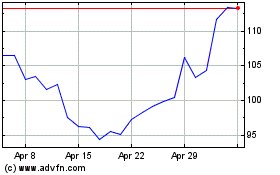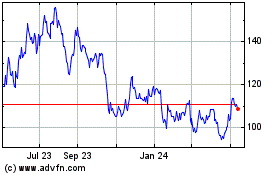U.S. Regulator Expected to Get Access to Alibaba, Baidu Financials -- Update
August 18 2016 - 2:35PM
Dow Jones News
By Kathy Chu, Chao Deng and Michael Rapoport
A long-running dispute between the U.S. and China over the
ability to vet auditors of Chinese companies listed on American
exchanges is edging toward a possible breakthrough.
Two big U.S.-listed Chinese companies -- Alibaba Group Holding
Ltd. and Baidu Inc. -- and their outside auditors are preparing for
audit inspections by officials from the Public Company Accounting
Oversight Board, the U.S. audit-industry regulator. The PCAOB is
expected to gain access in coming months to audit firms' records of
the work they did to review Alibaba's and Baidu's books, according
to people familiar with the situation. That could be a prelude to
fuller PCAOB inspections of the audit firms, a move long blocked by
the Chinese government.
PricewaterhouseCoopers' Hong Kong affiliate is Alibaba's
auditor; Ernst & Young's Beijing affiliate is Baidu's.
The ability to check auditors of foreign firms listed in the
U.S. is important to ensure auditing standards are upheld and
investors in U.S. markets are protected, observers said. U.S.
regulators have been particularly eager to vet how Chinese
companies have been audited, after a wave of alleged accounting
fraud and investor complaints about lack of financial transparency
at smaller U.S.-listed Chinese firms starting around 2011.
"It's critical for investors in the U.S. market that the PCAOB
is able to inspect Chinese audit firms," said Joseph Carcello, a
University of Tennessee accounting professor.
PricewaterhouseCoopers in Hong Kong didn't respond to a request
for comment. Ernst & Young in Beijing declined to comment. The
China Securities Regulatory Commission had no immediate
comment.
The PCAOB wouldn't confirm the move toward inspections, saying
only that it continues "to work toward obtaining access to the
information we need in order to conduct the necessary inspections
of registered firms in China and Hong Kong." The audit regulator
said it doesn't comment on specific audits.
The regulator long has attempted to inspect the performance of
China-based firms that audit many U.S.-traded Chinese companies,
the way the accounting board regularly inspects other audit firms.
But to date, the Chinese government has refused to allow the
inspections, citing sovereignty concerns. The Chinese government
has indicated the information contained in audits of Chinese
companies could be considered "state secrets."
The new developments may be a move toward resolving that
yearslong dispute, which has been marked by seeming steps toward
agreement followed by reversals. Most recently, the PCAOB last year
said publicly that it was close to an agreement to proceed with
inspections, only to have negotiations break down.
One person at a Big Four accounting firm said the firm has been
preparing for years for the possibility that the PCAOB will inspect
its working papers for U.S.-listed Chinese companies. The firm has
been conducting mock reviews of PCAOB audits for the past few
years, going over questions and grading the employees on how well
they answered, the person said.
It still is possible the Alibaba- and Baidu-related inspections
might not proceed. The audit documents provided to the PCAOB may be
heavily redacted, and the board may face other restrictions in
conducting the inspections, said the people familiar with the
situation, raising concerns about whether the board will be allowed
to conduct thorough inspections it is seeking.
The move toward inspections is a "good first step" in thawing
relations between U.S. and Chinese regulators, said Paul Gillis, an
accounting professor at Peking University's Guanghua School of
Management. "But that doesn't mean that the inspections will be
meaningful."
Mr. Gillis said he expects audit work papers to be moved to Hong
Kong for inspection, a way to ease the Chinese government's
concerns about foreign regulators working on Chinese soil.
PCAOB inspections are meant to assess the performance and
compliance with auditing rules of firms that audit U.S.-traded
companies. They are done on a regular basis and aren't a sign the
auditors or the companies have done anything wrong. But an
inspection would come at a sensitive time for Alibaba in
particular, as the U.S. Securities and Exchange Commission is
investigating the accounting practices of the e-commerce
company.
Alibaba and Baidu are among the biggest U.S.-listed Chinese
companies. More than 140 Chinese companies trade on major U.S.
exchanges, according to exchange data.
U.S. and Chinese regulators reached an agreement in 2013 to give
the U.S. access to audit documents of U.S.-traded Chinese companies
that are under investigation for potential wrongdoing, by routing
the documents through Chinese regulators. But that agreement
doesn't cover documents sought in connection with audit-firm
inspections.
In theory, the impasse over inspections could lead the U.S. to
bar audit firms that haven't been PCAOB-inspected from auditing
U.S.-traded companies, which would force those companies to find an
acceptable auditor or be delisted. U.S. regulators have continually
held back from such a step, however.
The Chinese "are trying to do whatever is necessary to prevent a
disaster, which is their companies being delisted," Mr. Gillis
said. "U.S. regulators are trying to make this problem go
away."
--Alyssa Abkowitz contributed to this article.
Write to Kathy Chu at kathy.chu@wsj.com, Chao Deng at
Chao.Deng@wsj.com and Michael Rapoport at
Michael.Rapoport@wsj.com
(END) Dow Jones Newswires
August 18, 2016 14:20 ET (18:20 GMT)
Copyright (c) 2016 Dow Jones & Company, Inc.
Baidu (NASDAQ:BIDU)
Historical Stock Chart
From Mar 2024 to Apr 2024

Baidu (NASDAQ:BIDU)
Historical Stock Chart
From Apr 2023 to Apr 2024
